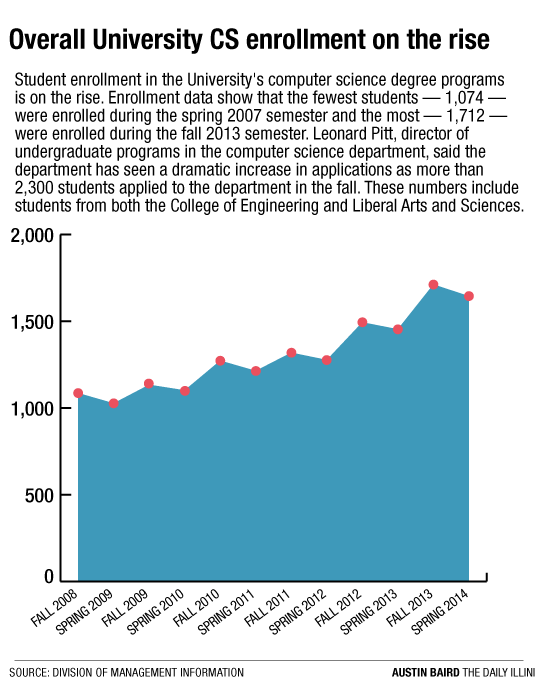Computer science enrollment on the rise
Apr 21, 2014
Last updated on May 11, 2016 at 05:06 a.m.
At Beijing Technology and Business University, Ke Wang said many of the computer science students who seek higher wages in the future want to transfer to finance. In Urbana-Champaign, the situation is quite the opposite.
Data obtained from the University’s Division of Management Information show that enrollment in computer science degree programs in the colleges of Engineering and LAS has been on the rise since it reached its lowest point during the spring 2007 semester.
Lenny Pitt, director of undergraduate programs in the computer science department, said the department has seen a dramatic increase in applicants.
The department received more than 2,300 applications in the fall, which Pitt said is a higher number of applications than any other major in the College of Engineering has received. Over the past five years, the department has grown by about 500 students.
Get The Daily Illini in your inbox!
“We’re turning away many very qualified students — I mean, excellent students,” Pitt said. “Some of them are being given a second choice of major in the College of Engineering, some are being deferred to DGS. It’s unfortunate that we can’t grow as quickly as the demand is growing.”
Pitt noted that the average ACT score for admitted students is about 34.3, which is a score higher in all categories than 99 percent of recent high school graduates who took the ACT.
Wang, a sophomore in economics currently enrolled in two entry-level computer science courses, would like to transfer into the computer science department; however, the competition is intense. He spends about 70 hours per week studying, but he said once he’s admitted, maybe he will have more free time.
Spending 70 hours a week studying may seem excessive, but Steve Herzog, coordinator of undergraduate programs in the computer science department, said the department requires a minimum 3.2 GPA overall and within required CS and math courses just to be considered for transfer.
However, he suspects that students will need a considerably higher GPA to actually transfer — maybe even higher than 3.5.
“Unfortunately, we can’t know because we don’t know how many petitions we’ll have, what those petitions will look like and how many students we’ll actually be able to take,” Herzog said in an email. “I know it’s really frustrating to students who are trying to figure out exactly what they have to do to get into CS, but we just don’t have an exact formula for success that we can guarantee.”
The surge in applications to the department, Pitt said, can be partly explained by the fact that over the last five years, computing has been reaching more people than ever. It’s easy now for people to directly see the relevance of computer science now that social media and apps permeate every aspect of life.
“In the past, it’s something that you kind of ran off and did on a desktop machine and it solved science problems,” Pitt said. “But now, it’s the way we communicate. It’s the way we recreate. It’s the way we do everything, frankly.”
Pitt added that he has a saying of his own — if you can think of an area that computer science hasn’t yet had an impact, you probably have an idea for a new app.
University computer science graduates have gone on to found many well-known startups, including Match.com, Yelp, PayPal and YouTube.
“Computationally, it’s just a very rich campus,” Pitt said, adding that it’s not only the computer science department that attracts students, going on to name a litany of computational organizations based at the University.
It also doesn’t hurt that the University’s computer science program is nationally ranked fifth by U.S. News and World Report.
Furthermore, the job market for computer science graduates is outstanding, Pitt said. According to the Bureau of Labor Statistics, the job outlook for computer and information technology occupations is growing at a rate faster than average, except for computer programmers, whose growth rate is expected to be as fast as average.
“Recently, the economy hasn’t been so hot,” Pitt said. “People have been having a hard time getting jobs — but not our students, and I’m sure that word gets around.”
Computer scientists work in just about every sector imaginable — telecommunication, computers, finance, manufacturing and medical. Computing has nearly endless applications, Pitt said.
He added that graduates who responded to his last survey reported an average salary of $85,000.
Students interested in computer science degrees will soon not be restricted to the currently available CS degrees in the CS and mathematics departments. Pitt said the department has built a template for additional CS degrees, referring to it as “CS plus X,” where X represents another department.
In the fall, incoming students will have already enrolled into the four new degree programs available in LAS: CS plus anthropology, astronomy, chemistry or linguistics. The department is in discussion with the College of Media to create a CS plus advertising degree, “but we’re probably going to end up with another half-dozen CS plus X degrees in LAS over the next year or two,” Pitt said.
“Even as we’re struggling to keep up with the growth that we have, we’re forming these degrees because it’s the right thing to do and we think there’s a really big, untapped market for students who want to combine a strong foundation in computing with upper-level courses in some LAS discipline,” he added.
Furthermore, the department is a big draw for international students, who make up half of student enrollment, Pitt said, while they composed 21.7 percent of the campus in fall 2013, according to ten-day enrollment numbers from the Division of Management Information.
Compared to China, Wang said the U.S. holds great opportunity for computer scientists. He said he thinks that the major may be so popular among international students because it is easier for them to work with math and engineering problems than problems concerning English.
“When taking CS 125, you are learning Java language, I am learning Java language — it’s the same thing to you and me because we are learning a (programming) language, but if I am learning English, we do not start at the same line,” he said.
Wang believes that the high demand for computer science graduates in the states and the possibility of work visas also contributes to the major’s attractiveness to foreign students.
China’s software market is not quite as mature as the United States’, he said, noting that infractions of intellectual property laws are common. When a market is more mature, wages will be higher for employees. On the flip side, it is more difficult to found a new company in a mature market like America’s because employees seek higher wages than an employer may be willing to offer.
Wang said he came to the states seeking the American Dream and aims to work here for a couple of years. Eventually, he will return to China, where the IT field is growing quickly — a sunrise industry, he said, where there is opportunity in founding an IT company.
“If ten years ago, we have a good opportunity in U.S., that probably means 20 years later, it will be a good opportunity in China for the same industry.”
Tyler can be reached at [email protected] or @TylerAllynDavis.






